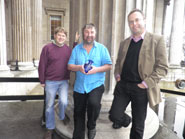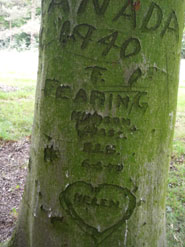Fieldwork during the summer of 2009 revealed a newly discovered stone circle at the end of the Stonehenge Avenue in Wiltshire. Originally comprising a setting of 20 Welsh bluestones created about 3000 BC, this is a major discovery.
Dr Pollard said: “It is believed that the stones were later incorporated into Stonehenge, and this discovery forces us to reconsider the whole history of the monument and its wider landscape.”
The results of this excavation confirm the hypothesis that Stonehenge was part of an integrated complex of monuments linked by the River Avon that were constructed to celebrate the ancestral dead of an important Stone Age lineage.
The second award went to Chantel Summerfield, a student on the MA in Conflict Archaeology at the University of Bristol, for an outstanding contribution to the presentation of Heritage Research.
Chantel won the award, co-sponsored by English Heritage and the heritage services of Britain and Ireland, for a contribution by a scholar under the age of 30.
Her study involved innovative digital recording of military arborglyphs on Salisbury Plain. These were carved on trees by American servicemen during the Second World War, and she has been able to reconstruct the personal stories of these servicemen and their fate during the war. The carvings provide poignant insights into the thoughts, feelings and emotions of soldiers training for war.
Professor Alexander Bird, research director for the Faculty of Arts said: “The presentation of these awards to both academics and students within the University demonstrates our commitment to research excellence in archaeology and its wider public impact.”

